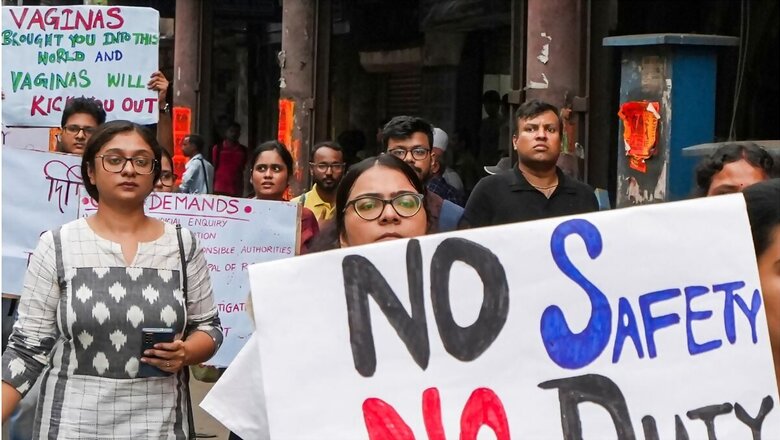
views
Prompted by nationwide protests from doctors in response to the alleged rape-murder of a postgraduate doctor in Kolkata, the Union Health Ministry has decided to revisit the draft bill to protect healthcare workers which was abandoned five years ago.
The ministry is now planning to form a panel to review the Healthcare Service Personnel and Clinical Establishments Bill, 2019. Although this draft bill was created by the Health Ministry, it was discarded by the Ministry of Home Affairs, which argued that it might set an undesirable precedent for other professions seeking similar exclusive protections.
“The new panel is likely to include representations from all stakeholders involved including doctors, medical associations and senior officials from multiple ministries,” a senior bureaucrat told News18 requesting anonymity.
“In 2019, the panel included officials from the law ministry, ministry of Home Affairs, doctors from All India Institute of Medical Sciences (AIIMS), representatives from the Indian Medical Association (IMA) and officials from health ministry. We are considering the same mix including the representatives from the young resident doctors,” the bureaucrat said.
On August 12, the Indian Medical Association (IMA) – India’s largest lobby of doctors representing more than 3.5 lakh allopathic doctors across India – gave “an ultimatum” of two days to the government to meet their demands which included the introduction of this central law.
Following the letter, IMA met Union Health Minister JP Nadda on Tuesday. “While the demand for medical colleges on security measures was accepted by National Medical Commission, on the two other demands (declaration of all hospitals as safe zones and the central Act on violence on doctors), the Minister said that he would consider. However, he promised to look into better working conditions for residents including provision of proper rooms for night duty etc.,” RV Asokan, president of IMA told News18.
Why India Needs A Law To Protect Healthcare Workers
According to an article published in the popular medical journal The Lancet, India has seen 153 reported incidents of violent assaults against healthcare workers, from 2007 to 2019. It said that despite this number being underreported, it is still “atypically high” for a country that is not in a conflict zone.
The authors of the opinion article – who represent the Association for Socially Applicable Research (ASAR), Pune, Maharashtra – wrote, “Violence against healthcare workers (VAHCW) is an urgent problem requiring attention from all societal stakeholders. It is not just a medical fraternity issue. It weakens the health system and affects the quality of services provided to patients, in turn, leading to more chances of violence. The key to breaking away from this vicious cycle is pushing for immediate zero-tolerance policies.”
How Will The Bill Protect Doctors?
In September 2019, the Ministry of Health and Family Welfare released a draft bill to address incidences of violence against healthcare professionals and damage to the property of clinical establishments. The ministry, led by Dr Harsh Vardhan had invited public comments till the end of September. However, the bill was put in cold storage by the Ministry of Home Affairs.
The draft Bill bans all forms of violence against healthcare workers, including doctors, nurses, paramedics, medical students, and ambulance drivers. Additionally, it prohibits any damage to hospitals, clinics, and ambulances.
According to the draft of the Healthcare Service Personnel and Clinical Establishments Bill, 2019, whoever commits violence against any healthcare professional shall be punished with imprisonment for a term of six months to five years and a fine of Rs 50,000 to Rs 5 lakh. Also, in cases of causing grievous hurt to any healthcare service personnel, the imprisonment would be from three years to 10 years with a fine of Rs 2 lakh to Rs 10 lakh.
It also says that in case, the property was damaged or lost, the person responsible might have to pay twice the amount of the property’s current market value or the value of the loss. Also, if someone causes minor harm to healthcare workers, they may have to pay Rs 1 lakh. If the harm is serious or severe, the fine could be Rs 5 lakh.
The bill gives the power of a strong enquiry system as all offences under the draft bill will be classified as cognisable which means that police officers can make arrests without a warrant, and it will be non-bailable. A healthcare professional who is affected by an offence can submit a request to the head of the hospital (or any clinical establishment) to notify the police. Also, any cases filed under this Bill will be investigated by a police officer of at least the rank of Deputy Superintendent of Police.




















Comments
0 comment